MangoProxy — Fast & Secure Proxy for Your Needs
Mango Proxy is a fledgling yet already trusted provider of premium residential proxy servers. The 90M+ IP pool in 220+ countries worldwide, as well as a 0.5 sec average response time and 99.99% uptime, are meant to bring success to those in charge of parsing, SMM, arbitration, and data analysis. 530+ businesses thus far can confirm.
When analyzing the proxy, we have conducted in-depth research that helped us reveal all the strong and weak points of the service. Considering expert opinion and customer feedback, our pros studied the range of options and, finally, tested the service.
Here are the steps we followed when conducting research:
Analyzing the customer feedback
We have visited several forums devoted to proxy discussion and even participated in it. We have studied reviews on reliable resources with only one purpose – to make our review precise.
Getting to know the expert opinion
We have communicated with experts in the proxy industry. To uncover some hidden pitfalls, we asked professionals about its key features. In our review, we will tell you everything you need to know about the strong and weak points of the proxy provider.
Studying Terms & Conditions
At this point, experts have studied the legal basis. They have touched upon the place of registration, owners, achievement, reputation, and so on.
Exploring proxy types
To understand the quality of services the company provides, we test each of the proxy types it offers. The range of proxy types can vary as well as their quality.
Evaluating the quality of support
The support team reflects the reliability of the company hence it is essential to check it. We pay attention to response time, the communicative skills of managers, and the usability of the service. Besides, our expert becomes a real user to get into the situation of purchase.
Testing the service
We have checked the proxy provider’s backward and forwards. To make our research full and deep, we have tried out all proxy types offered there. Our experts have analyzed the work of servers paying attention to their features and functionality. In our review, you can look through a detailed description of features.
Comparing
Our experts have compared this proxy with other popular services. In their comparison, they have touched upon the pricing, set of features, and characteristics. You can find out more in the Comparison section of the website.
- Best suited for affiliate marketing, traffic arbitrage, and e-commerce.
- UDP protocol support
- High anonymity
- Large IP pool and wide geo-coverage
- Unlimited concurrent sessions
- Rotating/sticky sessions
- Free geo-targeting (by country, state, city, and ASN)
- Good reputation
- Limited proxy types
- Lack of extra tools
Characteristics
- IPv4
- IPv6
- English
- Russian
- 220+
- Datacenter Proxies
- Residential Proxies
- Static Proxies
- SOCKS4
- SOCKS5
- HTTP
- HTTPS
- UDP
- API
- Anti-detect browsers
- Any software
- IP whitelisting
- Low fraud score
- No verification is required
- Manual and automated IP rotation options
- Proxies are instantly configured in the format fitting ANY undetectable browser
- Hard-to-reach and in-high-demand geo-locations are available
Overview
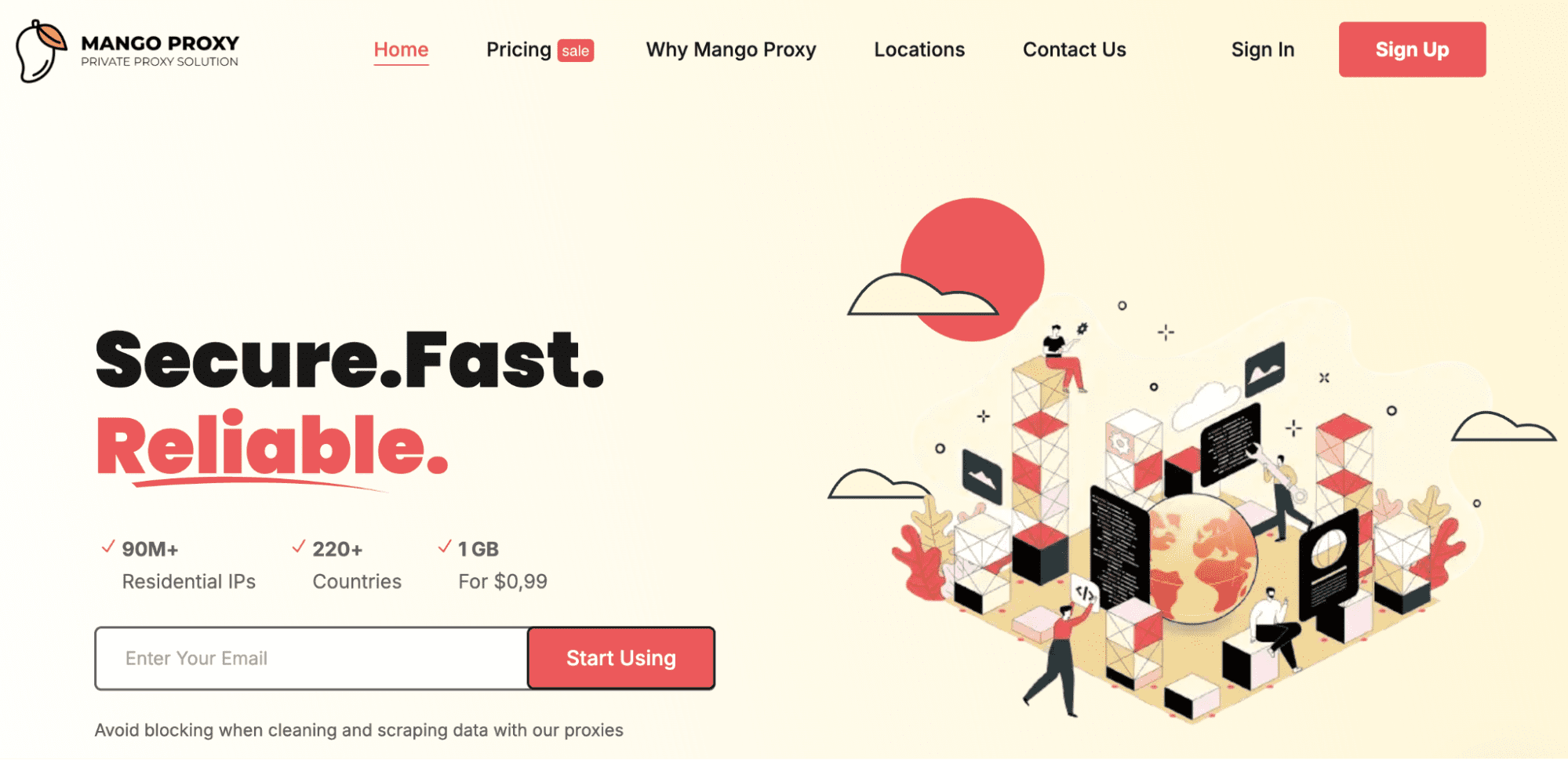
Well, I guess I must be honest with you: There’s nothing special about MangoProxy. Except for one thing—they’ve got over 90 million (!) premium residential proxies (updated weekly) in more than 220 (!) countries worldwide, and they serve this product to their clients at the highest level. Its geographical coverage includes even such exclusive and in-high-demand locations as the USA, Southeast Asia, Canada, LatAm, Europe, and Russia.
Features like HTTP/HTTPS/ SOCKS5 (plus, UDP) protocol support and unlimited bandwidth (to connect multiple accounts simultaneously) might be something you’ve got already accustomed to (so, did I actually.) Yet goodies you definitely can’t (and shouldn’t) ignore might surprise you:
- 99.99% uptime
- Low fraud score
- The 0.5 sec response time (on average)
- IP whitelisting
- Proxies are instantly configured in the format fitting ANY undetectable browser
- No verification is required.
If you wonder whether or not MangoProxy services will comply with your needs, you have my word: They definitely WILL if you deal with traffic arbitrage, data analysis, web scraping, or SMM. Those of you in charge of affiliate marketing or e-commerce are welcome, too. If you don’t take my word, though, believe the one from over 530 companies worldwide that have already entrusted its scraping operations precisely to Mango Proxy.
Feature Set and Guidance
If you follow my proxy reviews, you should already know I’m probably the biggest fan of small providers. By ‘small,’ I mean they don’t waste it on useless diversity of extras, and instead, they focus on one or two primary offers and bring it to perfection. Like MangoProxy, you know, they’ve got one type of proxies (instead of the typical 3 to 6), maintain its quality at the highest level possible (check out my performance testing results below in this review—you’ll be impressed!), and offer the richest choice of IPs and locations. Gosh, what else might one still need?
No malfunctioning tools, ragged online checkers, slowdowning port testers, or any additional features, either, to only get money off of you. Instead, they stack up features that are super relevant for both techies running automation and marketers navigating strict geo-filters. Let’s learn a bit more and pay close attention to that anti-detect integration—that’s some next-level stuff right there!

- Detailed IP Targeting (Provider Pool or City/State Level)
Granularity is key. Here, you’re not limited to vague regional zones. Instead, you can specifically hone in on the provider pool (ISP-level targeting) or drill down to a city or state. That, in particular, gave me hyper-localized IP control. And that, in turn, is clutch for things like local SEO, ad verification, or just ensuring your traffic looks like it’s coming from a real person in, say, Chicago rather than just the U.S. in general. It’s not just about where you’re routing from—it’s about who the network provider is, giving you that extra touch of authenticity.
- Rotation Interval Setting (0-120 Minutes) & Manual Rotation
You’ve got complete flexibility over IP rotation here. I mean, you can set those IPs to rotate every minute, or you can stick with the same IP for up to two hours. Plus, if you’re mid-session and need a new IP on the fly, there’s a manual rotation option that lets you change it with a single click.
- Quick Integration with Anti-Detect Browsers
This is what I love about Mango Proxy the most because I’ve never ever encountered anything of a kind anywhere else!
If you (just like me) are running undetectable browsers—I, in particular, use Multilogin, GoLogin, and AdsPower—MangoProxy has plug-and-play integration. Basically, their proxies are already formatted for the undetectable browser of your choice, so no fiddling with complex settings.
This is indeed a very rare feature—it has always been a pain for me to manually configure proxies for undetectable environments. And you do need it for managing multiple accounts across platforms like social media or e-commerce, where anti-fraud detection is fierce.
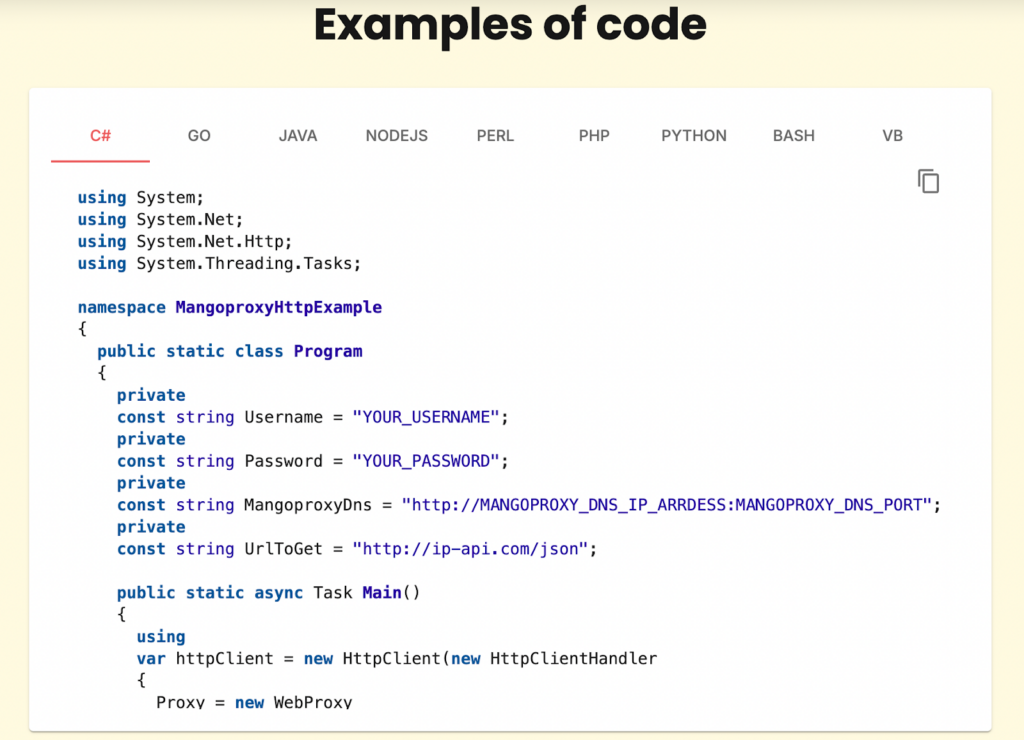
- Integration Code
This one’s for the devs. MangoProxy gives you ready-to-go code snippets to quickly implement proxy connections. Whether you’re using Python, JavaScript, or any other language, these scripts cut down integration time, letting you focus on what really matters—your application’s functionality. It’s a godsend for developers who don’t want to manually configure proxies every time, especially in environments where you need to automate tasks like scraping, testing, or geo-sensitive data collection.
- One-Click Creation of Proxy Lists
Here, you can generate them with a single click. Instead of manually pulling IPs or going through a complicated process, MangoProxy makes it painless to export a pre-built list of proxies. This feature saves you time when you’re working on something like a large-scale campaign or need to quickly distribute proxies across multiple tools or systems.
- Formation of White Lists
Here’s where things get personal. MangoProxy lets you curate white lists of proxies that meet your exact criteria—whether that’s by geography, speed, or other custom metrics. This means you’re not wasting time cycling through irrelevant IPs. Once you’ve found proxies that match your needs (maybe they connect fastest to the server you’re targeting or bypass geo-restrictions most smoothly), you can save them and reuse them. This is gold if you regularly need to fine-tune your proxy setups for optimal performance.
- Open API
They don’t just stop at UI controls — they’ve got an Open API with comprehensive documentation and instructions for advanced users. So, if you want to build custom integrations or manage your proxy infrastructure programmatically, the API lets you do that. You can automate proxy pool management, request fresh IP addresses, set rotation intervals, and more — all through RESTful calls. For tech teams scaling up and needing more granular control, this is a must-have feature that takes you beyond the point-and-click interface into full automation territory.
Usability
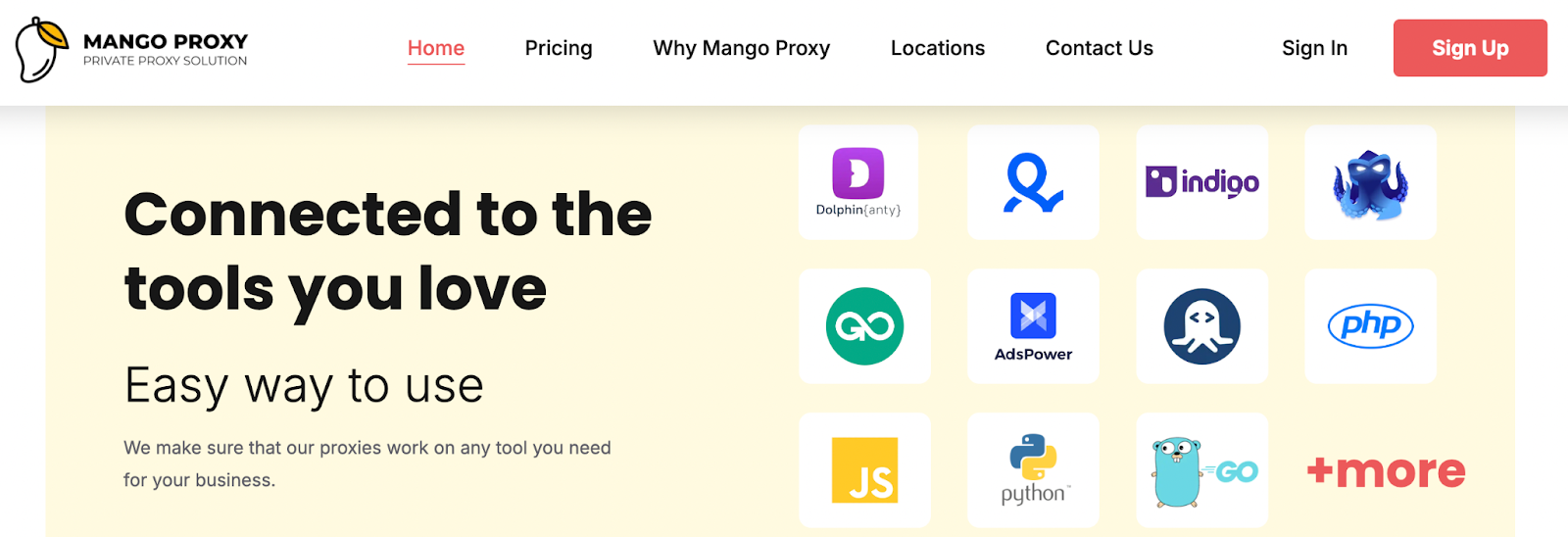
It’s REALLY EASY, and I mean it. Besides, it’s as easy for non-technical or casual customers as it is for advanced users.
The former will definitely appreciate a user-friendly interface, enabling you to connect to ANY software, web scraper, or automation script within just one minute. Let alone that its wide functionality allows you to connect an unlimited number of accounts!
Advanced users won’t feel deprived, either. Right there on the website, they can find examples of code for C#, GO, JAVA, NODEJS, PERL, PHP, PYTHON, BASH, and VB.
Just go for it and check it yourself!
Use Cases
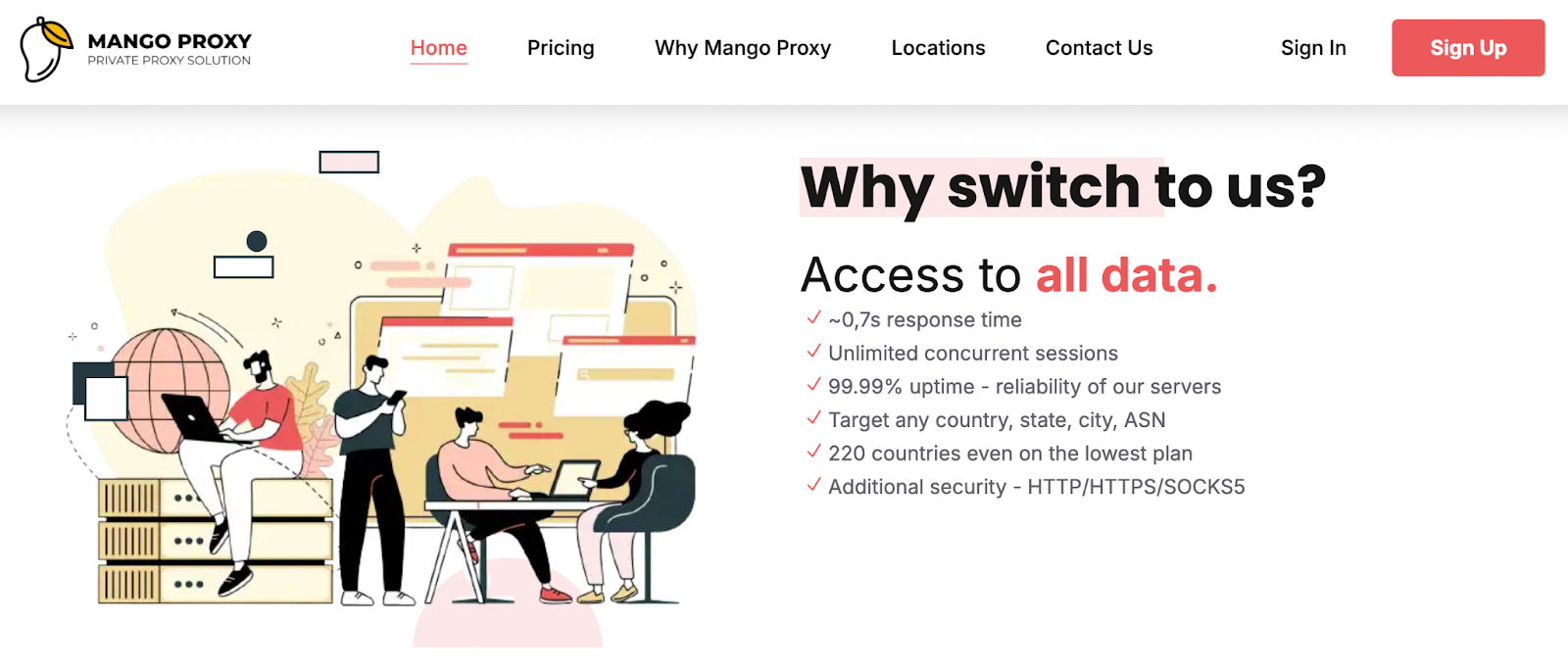
- Affiliate Marketing
If you’re in the affiliate game (just like me), you know how critical geo-targeting and localized traffic are. With residential proxies from MangoProxy, you can run multiple ad campaigns across different regions without worrying about being flagged or blocked.
Each proxy here mimics real user traffic from actual households, which gives your campaigns a serious legitimacy boost. Hence, feel free to promote offers on global networks or run niche local ads. You’re guaranteed to bypass IP filters that affiliate platforms or ad networks might impose.
- Arbitrage Traffic (Facebook, TikTok, Google Ads, etc.)
Running arbitrage is all about scaling fast, and platforms like Facebook, TikTok, and Google Ads are infamous for their strict IP scrutiny. MangoProxy’s residential proxy servers give you the flexibility to rotate IP addresses on-demand, letting you manage multiple ad accounts or campaigns without tripping alarms. This is especially useful for arbitrage where you’re driving traffic from one source and profiting off the spread—having fresh, undetectable IPs ensures you can scale without getting hit by those annoying bans or limits these ad giants love to slap on aggressive marketers. You can even set custom rotation intervals to rotate IPs dynamically as needed, so you always look like fresh traffic.
- E-commerce (Mass Captcha Solving)
Oh yes, I’ve long been managing e-commerce bots and tools; thus, I do know how running into captchas can really kill your workflow. MangoProxy’s IP rotation feature comes in handy here as well—you’ll be able to bypass captcha triggers en masse. Whether you’re updating inventory across multiple stores, making price comparisons, or setting up product drops that require high-frequency automation, these proxy servers let you handle it all without getting stuck in captcha purgatory.
- Data Analysis (Mailing Campaigns)
Most proxy services block mail-related ports, which is a huge headache if you’re running bulk email campaigns or automated mailers. MangoProxy, on the contrary, solves this by keeping its mailing ports wide open so you can send emails without limitations. Therefore, you can analyze mailing list performance or do outbound marketing blasts; you can even set the IP rotation to zero and lock in on a single IP address for consistent mailing. That way, you’ll be able to track deliverability, avoid spam filters, and ensure that your campaigns hit their target inboxes. It’s a rare find indeed!
Customer Reviews
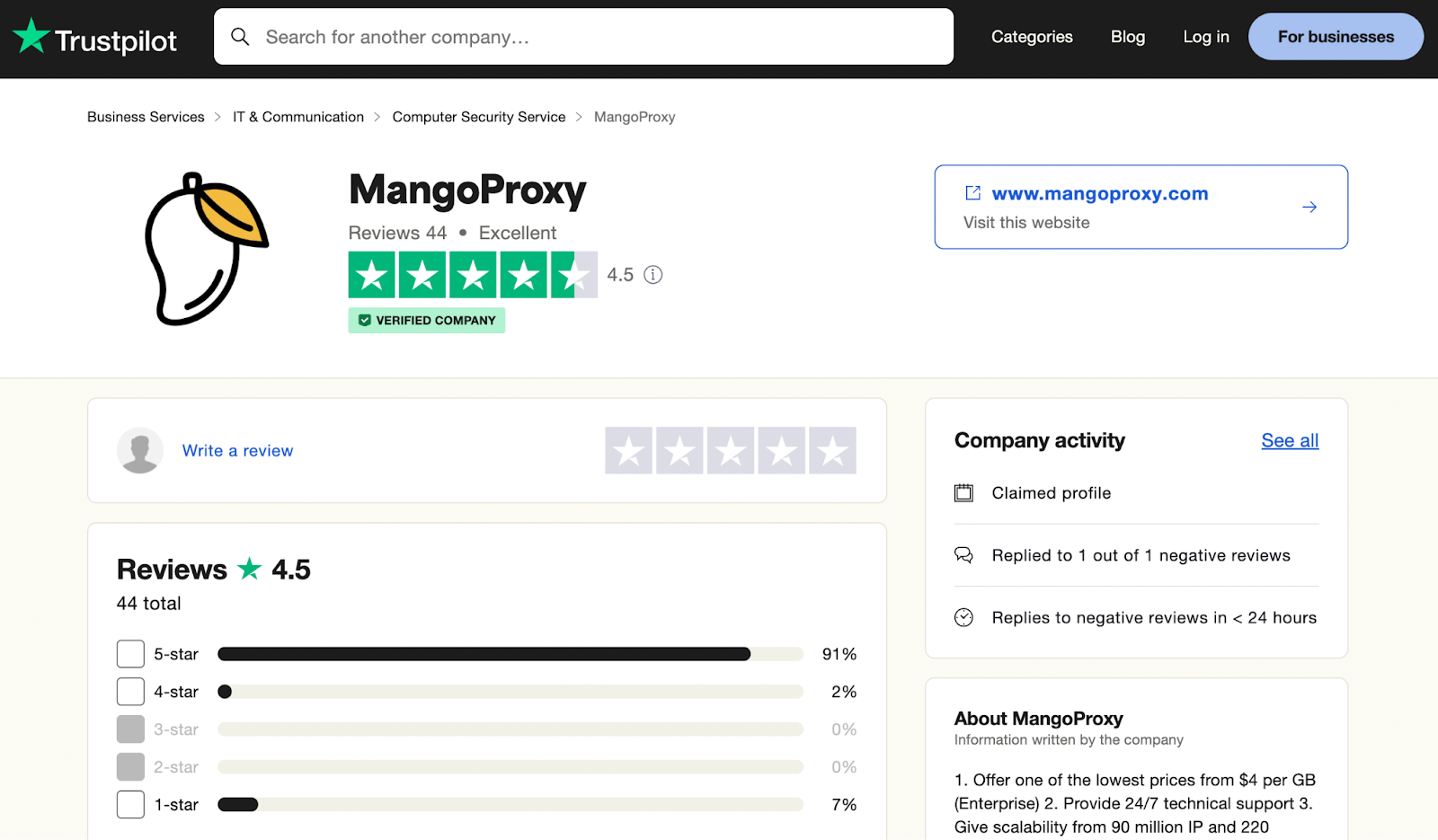
Given that this service is relatively new, I couldn’t find any proper reviews on sites like G2 or Proxy-Info or SiteJabber. Yet I did check its reputation among my tech & cybersecurity community (1K+ participants) and, of course, on TrustPilot.
As for the latter, there are only three 1-star reviews out there. Two of them were kindly and timely solved by its customer support reps, while the third one was—meh—hardly adequate. All other reviews were highly positive!
The overall rating of 4.5 stars based on 45 reviews is a pretty damn good performance evaluation! Trust, but verify! Therefore, let’s move on to my tests of this service…
Performance Testing
So, I first ran a quick speed test, and the connection was surprisingly close to my direct connection speeds, which I hadn’t expected from a proxy server altogether. The results were pretty solid:
Download speed — 614.25 Mbps
Upload speed — 103.36 Mbps
Ping — 10 ms
The performance was almost on par with my regular connection, with only a slight difference in latency. Definitely impressed with how smoothly the MangoProxy handled high-speed traffic!
Then, I checked its vaunted IP pool, and here’s what I’ve got:
| Gateway | Success Rate (on average) | Response Time(on average) |
| US | 98.79% | 0.91 sec |
| Australia | 96.31% | 1.26 sec |
| UK | 98.13% | 0.69 sec |
| India | 97.55% | 0.99 sec |
| EU | 99.01% | 0.49 sec |
| Brazil | 97.65% | 0.74 sec |
And finally, I did test the platform for any spam or scam activities and found… Nothing.
Or, rather, instead, I found out that mangoproxy.com is legit and safe to use. Its trust score is based on my automated analysis of 40 different data sources. Plus, its SSL certificate did prove valid, and the DNSFilter considered this platform safe!
Pricing & Plans
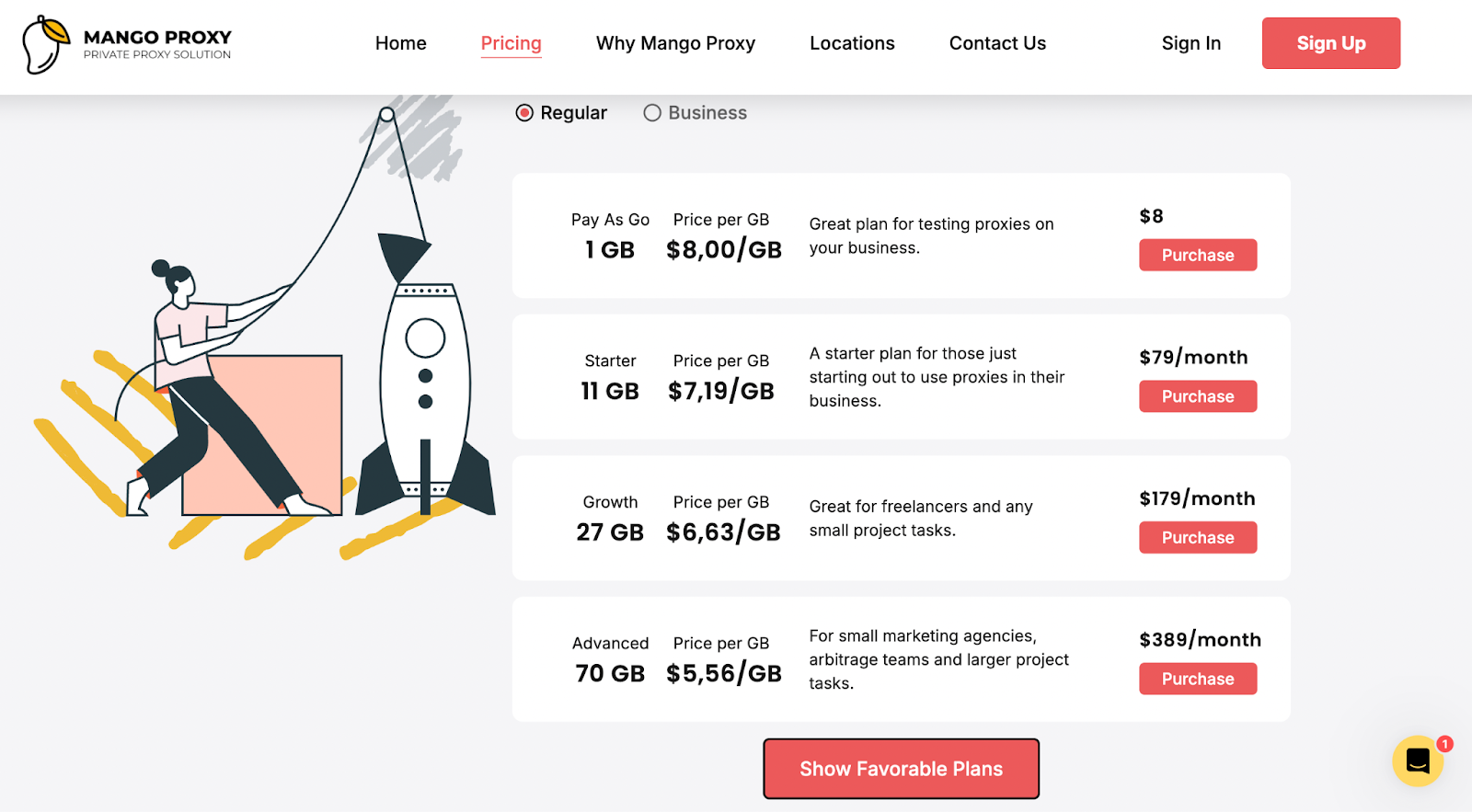
Here, you pay for the data you used instead of the number of rented individual IP addresses. That’s because MangoProxy has got a really massive rotating IP pool, so there’s no need to pay for each IP address one by one.
Pricing kicks off at $0.99/G if you’re just testing the waters, or you can dive into full-on packages starting at $8/GB for more serious use. Payments are available with all kinds of cryptocurrencies or global payment methods, so there is no hassle there, either. No hidden fees—I confirm. Besides, traffic does not burn out at the end of the month, meaning you can buy as many GB as you need.
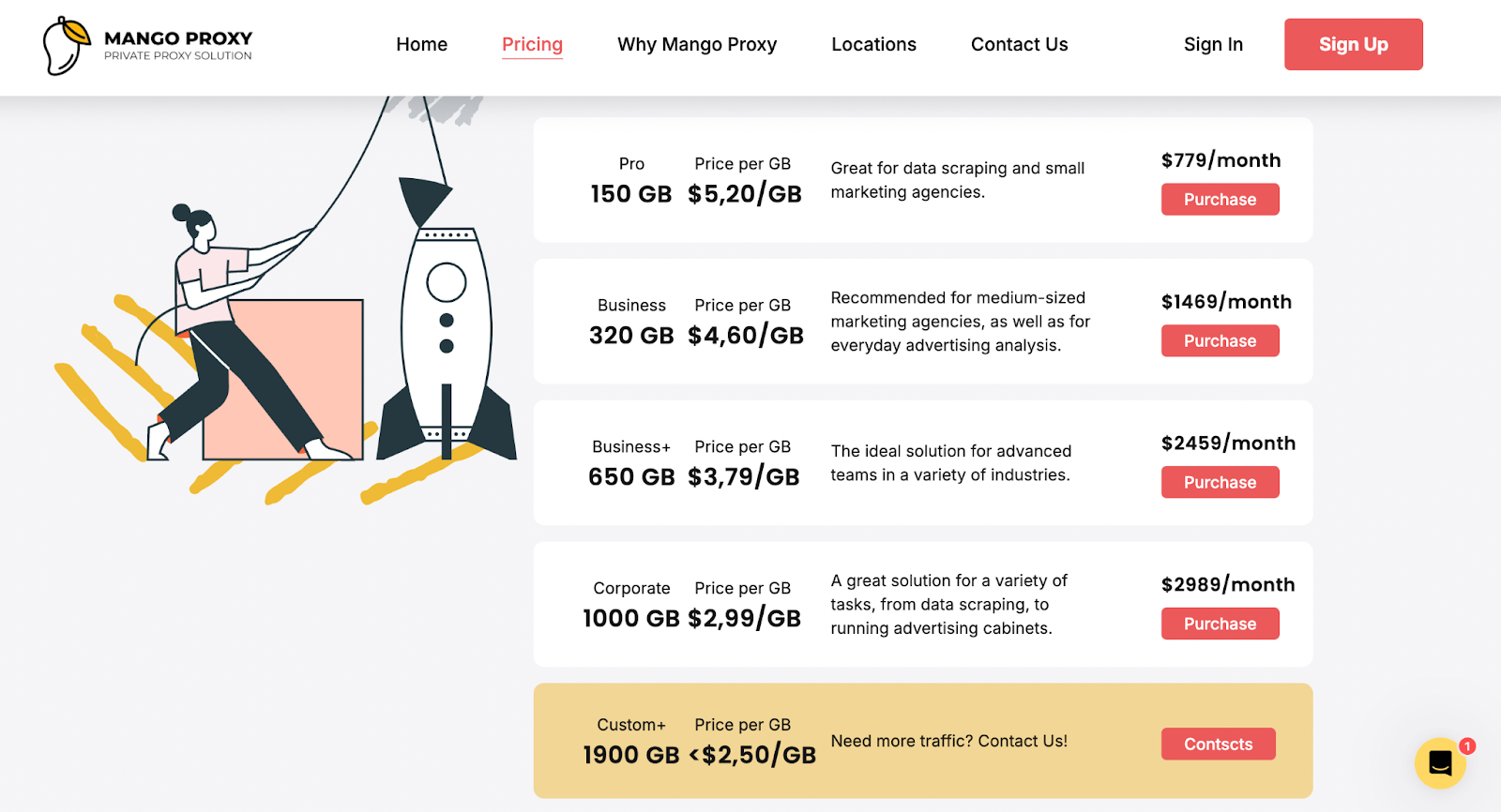
Free trial—which is built-in via personal account—is actually almost free as, in fact, it costs $1.7 for 1GB (you won’t regret it, take my word!)
You’ve also got a 3-day window to cancel your order, starting from the day you get access to the traffic. If you want to cancel, just shoot them an email with a clear heads-up.
Once they process the return, they’ll refund you within 30 days using the same payment method you originally used. Just a heads-up, for the return to be valid:
- It has to be within 3 days of purchase.
- You can’t have used any data—not even a single KB.
Final Verdict
I LOVE ‘small’ providers. And MangoProxy is a service that definitely contributes to such my feelings. It didn’t disappoint; it only proved my prior impressions. Mango Proxy does offer top-notch resi proxies, comprehensive rotation options, the richest pool of IPs, and the widest geo coverage. Grab it and enjoy—yep, that easy!











